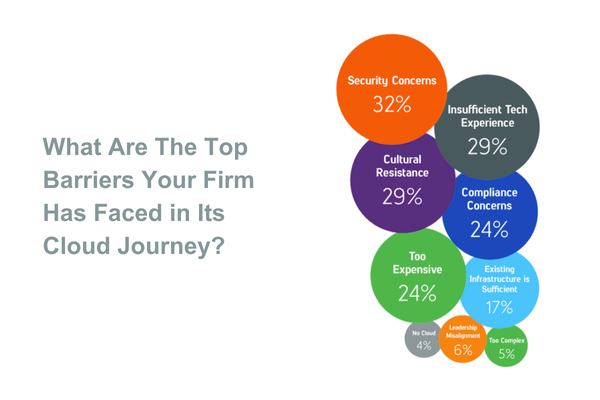The legal landscape is evolving rapidly, driven by technological shifts, client expectations, and market competition. Today’s clients expect law firms to be more responsive, secure, and accessible than ever before.
This transformation has placed law firm IT professionals at the forefront of change, empowering them to lead innovations that boost productivity, improve client experiences, and foster sustainable growth.
Cloud technology plays a pivotal role in this evolution, offering firms of all sizes an opportunity to streamline operations and better meet these new demands.
In this article, we will discuss the benefits of the cloud for law firms, what systems to move to the cloud, and how to make the transition seamless.
Are Law Firms Moving to the Cloud?
Recent trends show that smaller firms are leading the charge in cloud adoption. According to the American Bar Association (ABA), 60% of firms with 50 or fewer lawyers reported using cloud-based Document Management Systems (DMS) or Enterprise Content Management (ECM) libraries, compared to only 34% relying on on-premise systems.
According to the Tabush Group 2024 Law Firm Tech Survey, approximately 9 out of 10 firms said cloud capabilities are important factors when considering a new application. Furthermore, 48% of respondents said they would only consider adding cloud-based applications.
Only 4% of the law firms in our survey operate completely outside the cloud, down from 6% in last year’s survey.
Barriers to Cloud
According to our survey, security concerns remain the issue that firm leaders, administrators, and IT staff mention most often as a barrier to their transition to cloud-based technologies.

Only a few percentage points behind is insufficient in-house technical expertise and cultural resistance to change.
Larger firms face unique challenges in transitioning to the cloud due to the complexity of their legacy systems and organizational size.
This is where Managed Service Providers (MSPs) can play a critical role, helping larger firms navigate the intricacies of cloud migration and integration.
8 Essential Benefits of the Cloud for Law Firms
Moving to the cloud offers numerous benefits, which can significantly enhance the way law firms operate. Here’s a breakdown of the top eight advantages.
1. Stronger Security
With data breaches and cyber threats on the rise, law firms must prioritize security to safeguard sensitive client information.
Cloud providers invest heavily in cutting-edge cybersecurity measures such as:
- Encryption
- Multi-factor authentication
- 24x7x365 Monitoring
- Firewalls
This makes them more secure than traditional on-premise systems.
2. Flexibility for Hybrid and Remote Work
75% of our survey respondents said the most important benefits of cloud are greater mobility and accessibility. This is likely due to law firms continuing to settle into permanent, post-pandemic hybrid work environments.
Cloud technology supports flexible work environments, allowing attorneys and staff to securely access files and collaborate from anywhere. This flexibility ensures firms can operate seamlessly, whether employees are in the office or working remotely.
3. Better Client Experience
Cloud-based platforms provide real-time access to documents, enabling lawyers to collaborate more effectively and respond to client inquiries faster.
This level of responsiveness and accessibility is essential to delivering an exceptional client experience, which in turn drives client retention and satisfaction.
4. Simplified Updates
Traditional on-premise systems require regular manual updates, often leading to downtime. Cloud platforms, on the other hand, automate updates and maintenance.
This ensures that firms are always using the latest software versions with minimal disruption to daily operations.
5. No VPN Struggles
Law firms using cloud technology no longer need to rely on Virtual Private Networks (VPNs) for remote access.
VPNs are often:
- Slow
- Cumbersome
- Less secure
The cloud simplifies access for attorneys and staff, improving both performance and security.
6. Better Support
Cloud service providers typically offer round-the-clock technical support, ensuring that law firms can quickly resolve any technical issues.
This reduces the burden on internal IT teams and allows them to focus on strategic initiatives rather than troubleshooting.
7. Scalability
As a firm grows, so do its IT needs. Luckily, cloud platforms can easily scale to accommodate the growth.
They provide additional storage or processing power as needed without the need for expensive new hardware or lengthy installation processes.
Speaking of expensive hardware.
8. Cost Savings
Law firms that move to the cloud benefit from significant cost savings. By eliminating the need for on-premise hardware, firms save on upfront capital costs as well as ongoing maintenance and energy expenses.
This makes cloud adoption a cost-effective choice for firms looking to optimize their budget.
What Law Firms Are Moving To The Cloud
Law firms are adopting cloud technologies to streamline internal operations. Key areas that are driving this shift to cloud include:
- Email: Cloud-based email services like Microsoft 365 provide secure, easily accessible communication tools.
- Phone: VoIP (Voice over Internet Protocol) systems allow firms to manage phone calls seamlessly across multiple locations.
- Backup and Disaster Recovery: Cloud-based backup solutions ensure that data is securely stored and can be quickly recovered in the event of a disaster, preventing costly downtime and data loss.
- Desktops: Desktop as a Service (DaaS) enables law firms to offer a consistent desktop experience to employees, regardless of where they’re working, while ensuring security and compliance.
So how does one move all their IT to the cloud without downtime or errors?
How to Move Your Law Firm to the Cloud
Migrating to the cloud is a complex process, but with the right approach, it can be done efficiently and securely. Here’s a step-by-step guide to making the transition:
1. Find the Right Cloud Service Partner - Select a Managed Service Provider (MSP) that will guide you through the process, assess your needs, and customize and manage each step of the migration and beyond.
2. Create a Migration Plan - Work with the provider to develop a detailed plan for migrating data, involving key stakeholders and scheduling necessary training.
3. Perform a Test Run - Your partner should test applications in a cloud environment to identify and resolve potential issues before full migration.
4. Migrate Data and Applications - Carefully migrate data and applications, testing at each step to ensure everything functions properly.
5. Monitor the System - After migration, your provider should monitor your systems and address any issues to maintain optimal performance.
Ready to get started?
Move Your Law Firm To The Cloud The Right Way
Cloud technology is no longer just a nice-to-have for law firms, it’s an essential tool for staying competitive and meeting the growing expectations of clients. Law firms of all sizes should consider cloud adoption as a strategic move to enhance productivity, security, and scalability.
Tabush Group offers leading solutions to help law firms seamlessly transition to the cloud. With solutions like DaaS, we can help your firm move to the cloud efficiently and securely, ensuring you remain at the forefront of legal technology. And for firms already using multiple cloud applications, our cloud management solution can enhance security and streamline your accessibility.
Don’t get left behind. Move your law firm to the cloud today and take advantage of the many benefits it offers. Schedule a meeting today to get started.









